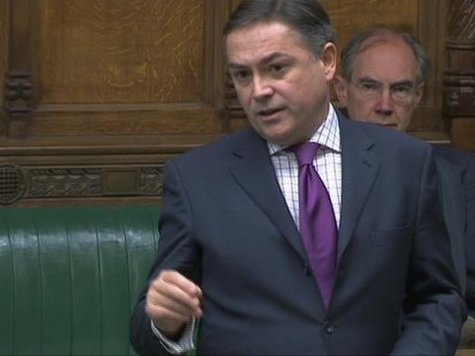
David Ruffley, the Conservative MP for Bury St Edmunds, last night announced that he would be standing down at next year’s general election. Ruffley has capitulated to mounting pressure and demands for his resignation since it emerged he had accepted a police caution for assaulting his ex-girlfriend earlier this year.
Yet, while Ruffley appears to have finally taken responsibility for his actions – even if he did blame media intrusion in his resignation letter – he will remain as an MP for ten more months. This means he will continue to earn his MP’s salary, taking home over £50,000 between now and his eventual departure. He secures himself another ten months’ worth of pension contributions, guaranteeing him a very healthy financial position when he finally does leave parliament. Of course, this is all courtesy of the taxpayer.
Money aside, his constituents in Suffolk will for the next ten months be represented by a man who committed an act of domestic violence against a woman. A man whose actions were deemed so inappropriate that he accepted he had to leave politics.
Where does this leave women in Bury St Edmunds who need the help of their Member of Parliament? Knowing what we know now, would a woman with a deeply personal issue feel comfortable attending a private meeting with Ruffley to discuss her problem? To put it bluntly, if a woman in Bury St Edmunds was suffering from domestic violence and needed the help of her MP, would she feel able to come to Ruffley for support?
Ruffley’s resignation letter is a de facto admission of guilt, or to be specific an admission that he should no longer remain as a representative of the electorate. This seems part of a growing trend among politicians who have been found to have done something wrong, whereby they accept that they have to go, but refuse to do so immediately.
The most obvious recent example of this is the former Liberal Democrat MP Mike Hancock. Last month, Hancock admitted that he had “crossed the line” when he sexually assaulted a mentally vulnerable constituent, accepting he had “degraded” her, and made her feel “uncomfortable” and “discriminated against”. Hancock resigned the party whip and agreed an out of court settlement with the woman.
This MP had confessed to some quite appalling behaviour in a remarkable statement read out in court. He left his party in disgrace. Yet to this da,y Hancock remains an independent MP for Portsmouth South, continuing to represent his constituents and draw his salary.
As with Ruffley in Bury St Edmunds, how can any woman in Portsmouth South who has suffered some form of abuse go to her MP for support? Hancock has accepted he committed some vile acts, accepted that he can no longer remain a Liberal Democrat, yet still thinks it is appropriate to act on behalf of his electorate.
By failing to do the honourable thing and fall on their swords as soon as their crimes are exposed, disgraced MPs leave their constituents in electoral purgatory. Between the moment they admit they are unfit for public office to the moment they leave, voters are left represented but unrepresented. This cannot be healthy for a democracy.
The Parliamentary Commissioner for Standards has the power to reprimand politicians for financial misconduct, but not for matters like these. If the authorities cannot do it, and the MPs themselves refuse to, the only real solution to this democratic deficit is a proper power of recall for constituents.
Allow voters to override the impotence of the authorities, to override the contempt of their representatives, and grant them a vote on whether or not their MP should leave immediately. Recall is the only way the likes of Ruffley and Hancock, the most dishonourable of disgraced politicians, will get what they deserve.

COMMENTS
Please let us know if you're having issues with commenting.